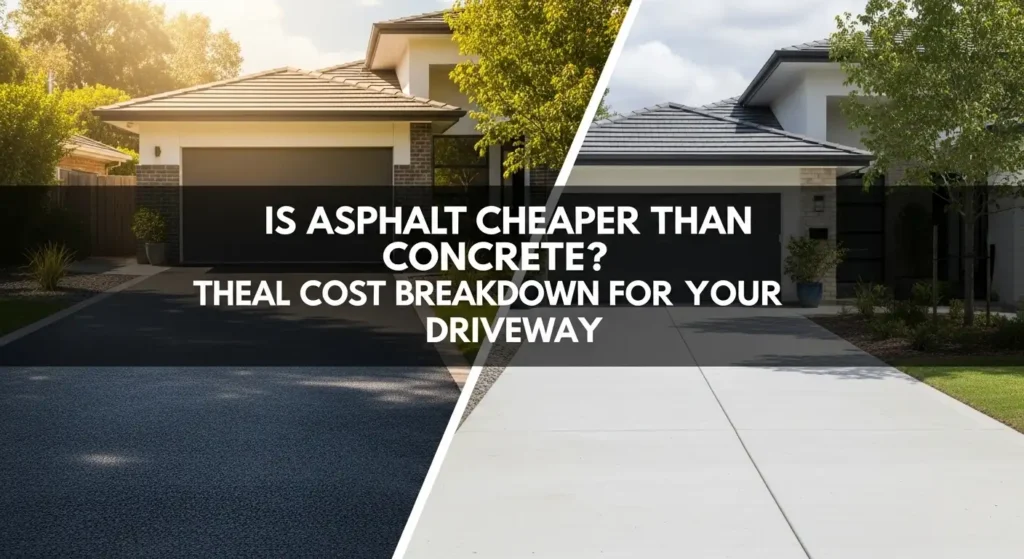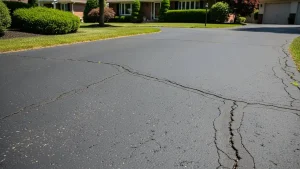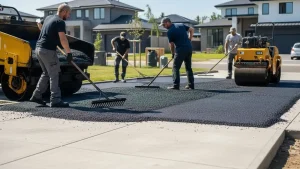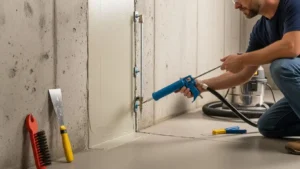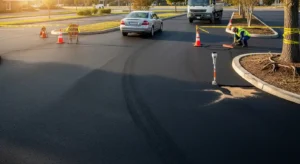You’re probably here because you’re thinking about getting a new driveway, and you’ve heard that asphalt might save you some money. Well, you’re not wrong, but there’s more to the story than just the price tag you see upfront. Let’s break down what you really need to know about these two popular paving materials.
The Short Answer (Because You’re Busy)
Yes, asphalt is typically cheaper than concrete when you first install it. You’ll pay around $5 to $12 per square foot for asphalt, while concrete runs about $6 to $15 per square foot. But here’s the thing – that’s only half the story. The real question isn’t just “which costs less today?” It’s “which will save me money over the next 20 years?”
Think of it like buying a car. Sure, that used sedan might be cheaper than a new hybrid, but what about gas and repairs down the road? Same deal with driveways.
Breaking Down the Actual Numbers
Let’s get real with some numbers you can actually use. If you’ve got a standard two-car driveway (that’s about 400 square feet), here’s what you’re looking at:
Asphalt driveway:
- Installation cost: $2,000 to $4,800
- Ready to use: 24 to 48 hours
- Lasts about: 15 to 30 years
Concrete driveway:
- Installation cost: $2,400 to $6,000
- Ready to use: 7 to 10 days
- Lasts about: 30 to 40 years
Right off the bat, asphalt wins on price. You’re saving anywhere from $400 to $1,200 just on installation. Plus, you can park on it way faster. If you need your driveway done quickly because you’ve got family coming over or you just can’t deal with parking on the street anymore, asphalt’s your friend.
What Makes Asphalt Cheaper Anyway?
There’s a good reason asphalt costs less, and it’s not because it’s inferior or anything like that. The materials themselves are just naturally less expensive. Asphalt is made from petroleum-based products mixed with rocks and sand. Concrete uses cement, which takes more energy to produce and costs more money.
The installation process is also simpler and faster with asphalt. Contractors can heat it up, pour it, roll it smooth, and be done in a day or two. Concrete’s more finicky – it needs perfect weather conditions, careful mixing, and lots of time to cure properly. More time means more labor costs, which means more money out of your pocket.
The Hidden Costs Nobody Talks About
Here’s where things get interesting, and honestly, where most articles stop short. Yeah, asphalt is cheaper upfront, but you can’t just install it and forget about it. Think of asphalt like a car that needs regular oil changes. Skip them, and you’ll pay way more later.
Asphalt maintenance you need to budget for:
- Sealcoating every 3 to 5 years: $200 to $500
- Crack filling when needed: $100 to $300
- Patching small areas: $150 to $400
- Complete resurfacing after 10-15 years: $2 to $4 per square foot
Concrete’s different. It’s more like that reliable old truck that just keeps going. Sure, you might need to clean off some oil stains or fill the occasional crack, but it doesn’t need constant attention. Most concrete driveways can go 10+ years without any major work.
The 20-Year Total Cost (This Might Surprise You)
Let’s do some math that actually matters. Say you install that two-car driveway today. Here’s what you’d spend over 20 years:
Asphalt total cost:
- Initial install: $3,500
- Sealcoating 4 times: $1,400
- Minor repairs: $600
- One resurfacing: $1,200
- Grand total: $6,700
Concrete total cost:
- Initial install: $4,200
- Degreasing once: $150
- Minor crack repairs: $300
- Grand total: $4,650
Wait, what? Yeah, concrete actually costs less over time. That’s the gap nobody’s really filling in the other articles. They tell you asphalt’s cheaper, which is true initially, but they don’t show you this bigger picture.
When Asphalt Actually IS the Better Deal
Before you think I’m just bashing asphalt, hold on. There are definitely times when it makes more sense, even with the higher maintenance:
Choose asphalt if you:
- Live somewhere with cold winters and lots of freeze-thaw cycles
- Need your driveway finished fast
- Plan to move within 5-10 years
- Have a tight budget right now
- Don’t mind doing regular maintenance
Asphalt’s actually better at handling extreme cold. It’s flexible, so it can expand and contract with temperature changes without cracking. Concrete’s rigid, so it’s more likely to crack when water freezes inside it. If you’re in Minnesota or upstate New York, asphalt might save you headaches.
When Concrete Makes More Sense
Go with concrete if you:
- Live in a hot climate like Arizona or Florida
- Want something low-maintenance
- Plan to stay in your home long-term
- Care about curb appeal and customization
- Don’t mind waiting a week before you can use it
Concrete stays cooler in hot weather, which is nice if you’ve got kids running around barefoot in the summer. It also won’t get soft and sticky when temperatures hit 100 degrees like asphalt can.
The Climate Factor Everyone Ignores
Here’s something most guides gloss over – where you live matters way more than people think. I’ve seen folks install concrete in freezing climates and end up with a cracked mess after just a few winters. Same thing with asphalt in desert heat – it gets soft, develops ruts, and needs way more maintenance.
- Cold climate (below 32°F in winter): Asphalt wins here. It handles freezing and thawing like a champ. Concrete can crack and break apart when water gets in those tiny cracks and freezes.
- Hot climate (above 90°F regularly): Concrete’s your best bet. It stays solid and cool, while asphalt can literally get soft enough to leave footprints in on super hot days.
- Moderate climate: It’s a toss-up. Go with your budget and how long you’re planning to stay in your home.
What About Repairs?
This is huge, and it’s another thing that affects your real cost. When asphalt breaks, it’s actually pretty easy to fix. A contractor can come out, cut out the damaged section, and patch it in a few hours. It won’t look perfect, but it’ll work fine. Cost? Usually $250 to $800 depending on the size.
Concrete repairs are trickier and more expensive. You can’t just patch concrete easily – it rarely matches the original color, and the repair is super obvious. Plus, if one section cracks, you might need to replace the whole slab to keep it looking decent. That can run you $300 to $3,000 depending on how bad it is.
So if you’re clumsy with your car or you’ve got teenagers learning to drive (no judgment), asphalt might save you money on inevitable repairs.
The Resale Value Question
Both materials add value to your home – that’s the good news. A nice, well-maintained driveway can add $5,000 to $15,000 to your home’s value, regardless of whether it’s asphalt or concrete. Real estate agents will tell you that curb appeal matters, and your driveway is a big part of that first impression.
But here’s what they don’t tell you: a beat-up asphalt driveway actually hurts your value more than an older but well-maintained concrete one. Buyers see cracks and wear on asphalt and think “ugh, another thing I need to fix.” They see some minor wear on concrete and barely notice it.
The Environmental Angle
If you care about sustainability (and hey, more people do these days), here’s the breakdown:
Asphalt is 100% recyclable. Old asphalt gets torn up and can be completely reused in new paving projects. That’s pretty cool, actually. The production does use petroleum products though, which isn’t great for the environment.
Concrete is mostly recyclable too, but producing the cement releases a lot of CO2 into the atmosphere. However, its lighter color reflects heat instead of absorbing it, which can help reduce the urban heat island effect in cities.
Honestly? Neither one’s perfect environmentally, but asphalt has a slight edge on recyclability while concrete is better for reducing heat in urban areas.
Installation Time: Why It Matters
Let’s talk about something practical – how long you’ll be dealing with construction mess. This matters if you work from home, have young kids, or just value your sanity.
Asphalt installation timeline:
- Day 1: Remove old driveway (if needed)
- Day 2: Grade and prepare base
- Day 3: Pour and roll asphalt
- Day 4: Ready to use (light vehicles)
- Day 5: Heavy vehicles okay
Total disruption: About 5 days, but you’re only totally blocked for 2-3 days.
Concrete installation timeline:
- Day 1-2: Remove old driveway and prep
- Day 3: Pour concrete
- Day 10-14: Can walk on it
- Day 21-30: Safe for heavy vehicles
- Day 28: Fully cured
Total disruption: Up to 30 days where you need to be super careful, though you can usually use it lightly after 7-10 days.
If you can’t park on the street for three weeks or you don’t have alternative parking, that’s a real problem concrete creates.
Making Your Decision
Look, I can’t tell you which one’s right for your situation because I don’t know your budget, your climate, or how long you’re staying in your house. But here’s how to think about it:
- Go with asphalt if: You need it done fast, you’ve got cold winters, your budget is tight right now, and you don’t mind some maintenance every few years. The lower upfront cost makes sense if you’re not planning to stay forever.
- Choose concrete if: You’re in it for the long haul, you live somewhere warm, you want minimal maintenance, and you can afford the higher initial cost. It’ll save you money eventually, and it opens up more design options if that matters to you.
- Still not sure? Get quotes for both. Talk to local contractors who know your area’s climate. Ask your neighbors what they’ve experienced. Sometimes the best answer isn’t the cheapest or the most durable – it’s the one that fits your actual life.
Need Help Making the Decision?
Choosing between asphalt and concrete isn’t always straightforward, especially when you factor in your specific climate, budget, and how long you plan to stay in your home. If you’re in Phoenix, Arizona or surrounding areas and want professional guidance on what’ll work best for your property, we’ve helped hundreds of homeowners make this exact decision.
At S&S Paving, we install both asphalt and concrete driveways, so we’re not trying to push you toward one or the other—we just want you to get what actually works for your situation. We can come take a look at your property, talk through your priorities, and give you honest recommendations based on what we’ve seen work (and not work) in your neighborhood.
Whether you go with asphalt or concrete, the most important thing is getting it installed right the first time. Check out our paving services to see what we do, or just give us a call if you want to talk through your options. No pressure, no sales pitch—just straight answers from people who’ve been doing this for years.
Choose the Right Driveway Material for Your Home
Deciding between asphalt and concrete doesn’t have to be confusing. Asphalt is usually cheaper upfront and quick to install, while concrete offers long-term durability with less maintenance. Don’t let uncertainty slow your project — if you want expert guidance and a hassle-free experience, book an appointment today. Your perfect driveway starts with the right choice!
Your Questions Answered
How much cheaper is asphalt compared to concrete per square foot?
Asphalt runs about $5 to $12 per square foot installed, while concrete costs $6 to $15 per square foot. So you’re saving roughly $1 to $3 per square foot with asphalt. For a typical two-car driveway, that translates to around $400 to $1,200 in immediate savings.
Does asphalt really last as long as concrete does?
Nope, not even close. Asphalt lasts 15 to 30 years on average, depending on how well you maintain it. Concrete can last 30 to 40 years, sometimes even longer. That’s one big reason concrete can actually cost less when you look at the total lifetime expenses.
Can I just install asphalt or concrete myself and save the labor costs?
I wouldn’t recommend it unless you’ve got professional equipment and experience. Asphalt needs to be heated to specific temperatures and rolled properly while it’s still hot. Concrete needs perfect mixing ratios and timing or it won’t cure right. A botched DIY job will cost you way more to fix than just hiring someone who knows what they’re doing.
Which one holds up better in really cold weather?
Asphalt handles cold climates better because it’s flexible enough to expand and contract when temperatures swing wildly. Concrete’s rigid, so it cracks more easily when water gets inside and freezes. If you’re dealing with harsh winters and lots of freeze-thaw cycles, asphalt’s usually the safer bet.
How often am I gonna need to maintain an asphalt driveway?
You should sealcoat it every three to five years to protect it from water damage and sun exposure. You’ll also want to fill cracks as they show up and maybe resurface it after 10 to 15 years. Concrete needs way less attention—mostly just occasional cleaning and fixing any cracks that develop.

